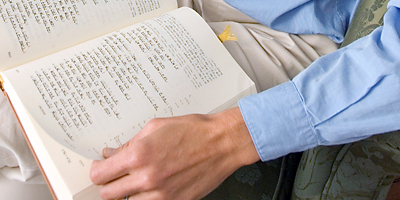
 CHARLESTON—When Elizabeth Kirkland Cahill was 16 years old, she made a list of things she wanted to accomplish in life.
CHARLESTON—When Elizabeth Kirkland Cahill was 16 years old, she made a list of things she wanted to accomplish in life.
She’s done quite a bit since then, checking items off her list and adding new goals along the way.
She said she came across her compilation recently before it once again disappeared during her family’s move back to Charleston.
Cahill doesn’t remember everything she wanted to do back then, but two items stand out. One was to trek through the Himalayas, which she did.
The other was to learn Hebrew so she could read the Bible in its original language. That turned out to be the most gratifying accomplishment by far, she said.
When Cahill talks about the language of the Bible, her eyes shine and a warm smile lights her face. It’s hard to describe without sounding over the top, but she’s truly radiant about the original word of God.
“Biblical Hebrew is a gorgeous, expressive, playful, wonderful language,” she said. “You really feel like there’s a divine Spirit infusing the language.”
She said it is clear the people who wrote it had a tremendous connection to God and really strived to bring Him to the page.
While learning Hebrew has been her most gratifying goal, it was also one of the most difficult to reach.
Highly intelligent, she is devoted to education in a warm, inclusive way, wanting to share the joy she has found, whether it be in Hebrew or Shakespeare, with everyone else.
Cahill — Betsy Kirkland at the time — started her education at Ashley Hall in Charleston. From there, she attended Radcliffe College at Harvard University from 1979-1983, and graduated magna cum laude and Phi Beta Kappa. She was chosen to deliver the original Latin oration at her commencement.
 Next she studied at Christ Church at University of Oxford from 1983-1986 as a Rhodes Scholar, with a specialized study in Greek tragedy, Shakespeare and Yeats.
Next she studied at Christ Church at University of Oxford from 1983-1986 as a Rhodes Scholar, with a specialized study in Greek tragedy, Shakespeare and Yeats.
She moved to New York and had the good fortune to meet Joseph Pape and become involved with his program of Free Shakespeare in Central Park.
Cahill said she worked with several actors to help them with the language of Shakespeare, including Mandy Patinkin and Kevin Kline.
Even more wonderful, she and Pape co-authored a book in 1988 called “Shakespeare Alive” designed to introduce the great playwright to students in a fun, accessible way. Cahill said the book is still in publication.
In 1990, she married John Cahill, with whom she has four children: Ella, 18, Thomas, 16, Jack, 14, and Charlie, 10.
She said all of her children were baptized in the Cathedral of St. John the Baptist. Her brother-in-law, Deacon Joseph Cahill, baptized the younger two after he was ordained.
Cahill said participation in the Catholic Church was not something she expected. Raised an Episcopalian, she was married in St. Michael Church, but over time she came to a slow conversion, both spiritually and intellectually.
Some of the major influences in her conversion were a group of Jesuit priests, whom she described as the embodiment of faith and reason working together; Sister John-Baptist, a young Carmelite whom she had wonderful talks with on religion; and a former Episcopalian priest who had converted to Catholicism.
Plus, no matter where in the world she and her husband traveled, they could find a Catholic Mass.
“The entire tradition stretching back to the early church was so appealing, the belief in social justice, and the wide diversity of the parishes,” Cahill said.
Once she joined the Catholic Church, she started an adult education program and a Bible study class in her parish in Connecticut, she said. This was one of the events that reawakened her desire to learn Hebrew. Cahill said she wanted to dig deeper, to understand not only the original language, but the context behind it.
Starting in 2006, she attended Yale Divinity School, where she graduated summa cum laude with a master’s in religion. She said obtaining a degree was a different experience this time around, with the dynamics of being a mother thrown into the mix. One time, her son made a large sign for her study door, warning everyone that mom was studying Greek and Hebrew. “It’s the law to knock first!” the sign proclaimed.
Cahill said her family has always been supportive. Now that they are back in Charleston, and living in the house where she grew up, she hopes to put her education to use with some uplifting programs at the Cathedral.
She said the family home is known as the John Drayton townhouse. It was built in 1746 and came into her family when her great-grandfather bought it as a wedding gift for his daughter in 1902.
Cahill said she and John started renovating it a few years ago. During a visit to Charleston after the renovations were complete, she felt like the house was waiting for the family, and they decided to return home.
They have only been back for a few months, and are getting reacquainted with the area, the parish and the school system.
Cahill said she now has a revised list of goals, and at the top is a way to make a difference in public education in South Carolina.
“I’m pondering the whole system and looking for the best way to help,” she said.
